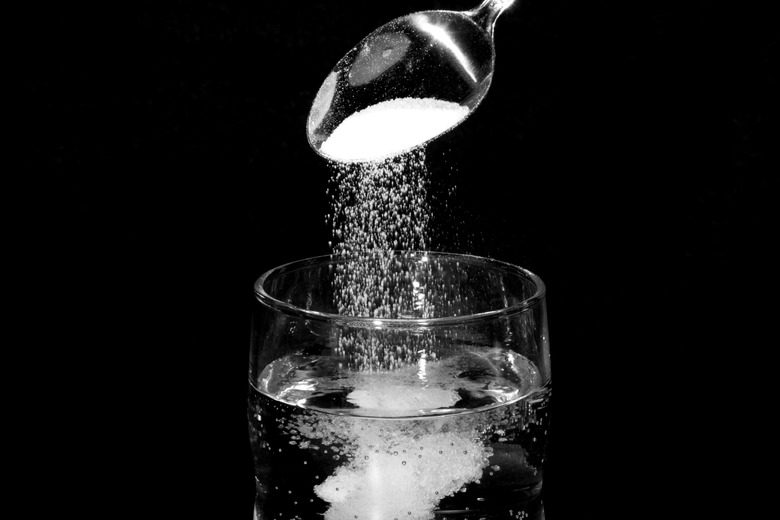What Happens When Salt Is Added To Water?
The sight of ordinary salt dissolved in water is, in all likelihood, entirely familiar to you, as the phenomenon literally dominates the globe. Over two-thirds of Earth's surface is covered by ocean water, which is notably saline, or "salty," in character. ("Sal" is the Latin word for salt.)
Table salt is made of the ionic compound **sodium chloride,** which consists of the chemical elements sodium and chlorine. You probably learned from unintentional play at the kitchen table as a child that if you sprinkle salt into a glass of pure water, the salt disappears after a time; the more salt you add, the longer this takes, and it may require some shaking or stirring to bring about.
Solids dissolving in a liquid solvent (usually water in chemistry experiments) create a solution, and salt dissolving in water is a classic example of how a polar solute behaves in a polar solvent such as H2O. Along the way, you'll get a side dish of acid-base chemistry just to round out the "flavor" of the salt-water experience!
Salt and Water: The Basics
Salt and Water: The Basics
Water (H2O) consists of the elements hydrogen (denoted by H on the periodic table of elements) and oxygen (O) in a 2-to-1 molar ratio. This means that there are two H atoms for every O atom in water. Because an oxygen is about 16 times more massive than a hydrogen atom, however, the water molecule is nearly nine-tenths oxygen by mass.
Water is a solid at temperatures below 0 °C, a liquid between 0 °C and 100 °C and a gas (water vapor) at temperatures in excess of 100 °C. It is polar, meaning that although it has no net charge, parts of it (in this case the oxygen atom) are slightly negative because of a higher density of electrons, leaving other portions (in this case the hydrogen atoms) slightly positive.
Table salt (sodium chloride, or NaCl) is an ionic compound, meaning that the bond it forms results from the donation of an electron from one atom (here, Na) to another (Cl), rather than from the electron sharing seen in covalent bonds. This makes the bond highly electronegative, the consequences of which when NaCl is dissolved in water will soon become apparent.
Does NaCl React With Water?
Does NaCl React With Water?
Astute readers might wonder why the familiar chem-lab acid HCl, hydrochloric acid, does not form when NaCl is placed in water. The putative reaction is
NaCl + H2O → NaOH + HCl
While this reaction could proceed in theory, it is extremely energetically unfavorable. This is because HCl is a much stronger acid than water and happily sheds its proton in solutions with acidity far greater than that of water, which has a neutral pH of 7. Also, sodium hydroxide (NaOH) is a very strong base that would gobble up the released H+ ions anyway, making water.
The arrow in the above equation should therefore be pointing in the other direction, as this favors the thermodynamics of the solution.
Salt Dissolved In Water: Molecular Interactions
Salt Dissolved In Water: Molecular Interactions
Already noted was the polarity of both the water molecule, which you can imagine as roughly boomerang-shaped, and the NaCl molecule, which looks more like a short dumbbell.
When table salt is placed in water, the slightly electropositive sodium portion is attracted to the slightly electronegative oxygen portion of water molecules. At the same time, the slightly electronegative chlorine portion of NaCl is attracted to the slightly electropositive hydrogen portion of water.
In neither case is a true bond created, but the attractions set up a "tug-of-war" in which the ionic bonds of NaCl and the covalent bonds of H2O are both strained.
The stronger covalent bonds of water (which is also held together generally by hydrogen bonds between water molecules) win out, and NaCl is pulled apart, with the Na+ and Cl_ ions setting loosely in place between the intact H2O molecules. NaCl is then dissolved.
Cite This Article
MLA
Beck, Kevin. "What Happens When Salt Is Added To Water?" sciencing.com, https://www.sciencing.com/happens-salt-added-water-5208174/. 19 November 2020.
APA
Beck, Kevin. (2020, November 19). What Happens When Salt Is Added To Water?. sciencing.com. Retrieved from https://www.sciencing.com/happens-salt-added-water-5208174/
Chicago
Beck, Kevin. What Happens When Salt Is Added To Water? last modified August 30, 2022. https://www.sciencing.com/happens-salt-added-water-5208174/
